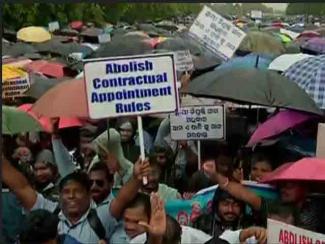What Happened to Your Promise of Abolition of Contract Labour, Mr. Naveen Patnaik?
Despite the Odisha Government's proclamation, the ambitious goal of regularizing 57,000 contract workers, predominantly engaged in vital sectors such as education, health, home, and welfare departments, has unfortunately not seen the light of the day.
The Odisha government made an official announcement in October, 2022, promising complete abolition of contract system in appointments in the state government. This announcement triggered nationwide discussions, drawing attention to the significance of the issue. Regrettably, even after one year of the declaration, the actual implementation of this decision of abolition of contract system remains elusive. The government departments have not really begun any process for the regularization contract labour.
On the contrary, to add fuel to the fire, the state government announced recruitment of 20,000 teachers on a contractual basis just before the assembly elections. This is nothing but making the failed promise of abolition of contract labour a mockery. A substantial number of workers continue to operate on the basis of outsourcing in various state departments and district offices. The conspicuous silence of the BJD government on the question of their regularisation exposes the fallacy of the promise of 2022.
In an attempt to justify the recruitment of workers on the basis of outsourcing, the government contends that these workers bring a higher level of expertise and effectiveness, particularly in critical sectors such as healthcare and education. However, the stark reality is that the wages paid to these outsourced workers in the state are exceptionally low. Even in skilled positions like lecturers, those who are teaching for decades on contractual basis are only earning a meagre sum of Rs 20,000 per month. In most aided colleges, the dream of job security remains a mirage for the teachers recruited on contractual basis.
Presently, the outsourced workers are coming together on their demand for basic rights of the working class – equal wages for equal work, job security, and a much-needed salary hike. In response to the growing momentum of their movement, the government did make a revision to the monthly consolidated remuneration of contractual and outsourced workers. Despite this revision, where an individual previously receiving Rs 8,070 now gets Rs 10,100, the wage of contractual workers remains too low. This is a matter of concern particularly in the backdrop of rising prices, which places an additional burden on the already strained livelihoods of these workers.
Outsourced workers are intensifying their movement across 30 districts in Odisha, exerting pressure on authorities not only to revise the pay structure to higher bands but also to eliminate contractualisation from the government departments. The workers are also demanding immediate filling up of 4 lakh vacant posts in Odisha.
The Odisha government must know that regularisation of contractual workers and end to contractualisation are very popular demands of workers today. Any attempt of betrayal of the promise of regularisation is bound to have a telling effect on the forthcoming Lok Sabha elections in the state.

